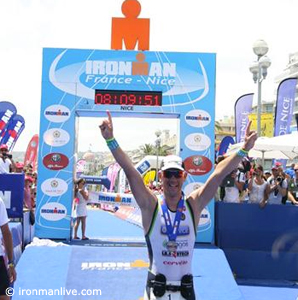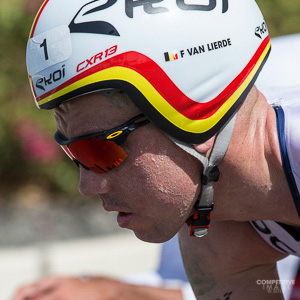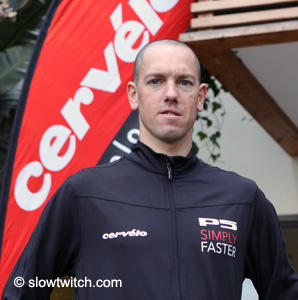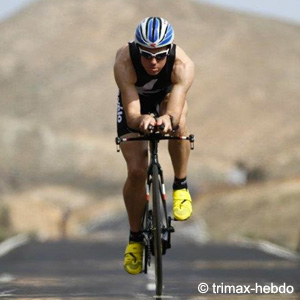Van Lierde on center stage again
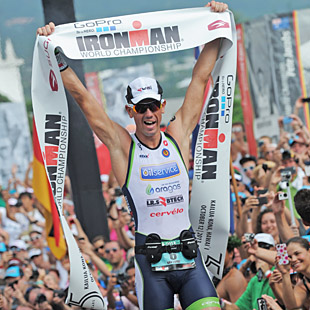
In contrast with his coach's shock-the-world, race record win in his Kona debut in 1996, Frederik Van Lierde's 2013 win came as a result of a gradual progression over a 17-year career and a precise, finely honed sense of when to be patient and when to strike for the jugular.
While nowhere near Luc Van Lierde's 1996 race record 8:04:08 that lasted 16 years, Frederik's 8:12:29 winning time was the 13th fastest in Kona history and 9th fastest men's winning time – a very respectable mark.
While his win should not have been a major surprise after a dominating second win at Abu Dhabi International and his third straight victory on the very challenging Ironman Nice course earlier this year, Frederik operated quietly in the shadows of more spectacular rivals until the moment arrived to take control of the race.
The answers seen here came from the post race press conference and follow-ups in the one-on-one scrums that surround the winner of Ironman's biggest day.
Question: How does this victory make you feel?
Frederik Van Lierde: It's a dream come true, I guess, like every triathlete would have. It makes it special, of course, because Luc (Van Lierde) is my coach since three years. He won it twice [1996 and 1999] and he was the only Belgian to do so before today. Now I can add Van Lierde once again to the list.
Q: You were very consistent today — good swim [tied-for-4th-best pro 51:02] a great bike ride [4th-best pro 4:25:35] and very consistent [4th-best pro man 2:51:19] on the run. Unlike last year when Andreas Raelert just took off from you on the run [Raelert's 2:47:23 to 2:52:49 marathon advantage overcame a 4 minute deficit to Van Lierde at T2]. What changed from last year to this year?
Frederik: Well in training I felt I got so I could handle a little bit more. And of course I learned a lot from last year. The beginning of my marathon last year wasn't that strong, but my second half was really strong. And so we tried just to get stronger on the bike again and run a little bit faster at the beginning of the marathon. But then, of course, have a good second half of the marathon.
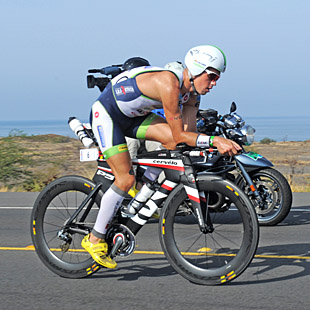
Q: What did you gain from your 3rd place last year?
Frederik: After last year of course you start to believe a lot more in your own chances. And yeah, the last two weeks before this race I felt really good. I knew I would do a good race. In the end, I wanted to put it all on the table this day.
Slowtwitch: Frederik, your perfectly balanced race with no one spectacular split follows the successful 2012 Pete Jacobs race plan. But how do you feel about being outrun by the women's champion [Carfrae 2:50:39, Van Lierde 2:51:19]?
Frederik: This is the first I heard about it. So it didn’t matter to me.
Sebastian Kienle breaks in "The fact that the winner of the men's race had a slower marathon split than the women shows how hard the men's bike ride really was. The men have more surges and we use more energy to cover."
Q: Frederik, tell us about your coach.
Frederik: Luc van Lierde won this race twice. When [someone of that caliber] gives you a training program and tells you about the race, and plans everything you do in the year, you don’t doubt about it. You don't have any questions. I fully believe in his support and his plan for me at this race.
Q: It seems you shut it down after Ironman Nice — just a few short races [2nd at Marseilles 5i50 on July 28 and a win at the Deinze half on August 25] and then really focused on Kona.
Frederik: Since I work with Luc, I do fewer races in the year. Then it works well for me.
Q: Did you feel like you knew you could win it?
Frederik: I didn’t know I was going to win this race. But I felt strong and I felt ready to race for the win.
Q: How satisfying is it to nail it?
Frederik: I have talked a lot about that with Luc. We thought it might happen one day. But this year everything worked so well. Sometimes you have to be lucky as well. So I won Abu Dhabi and then Ironman France and then I did all the things we put together to train.
Q: Have you realized what this means yet?
Frederik: I think I don't realize it 100 percent right now. I am happy of course and I am really excited. I think it will start when I get back home and get to my family and see all the people who worked together with me. Of course it is my performance, but I know how many people who have worked on this. I think I will understand it 100-percent when I get back home.
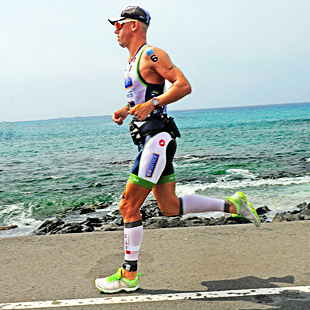
Q: At what point did you sense you might get it done this year?
Frederik: It was on the swim. Normally I am in the leading group. But this year I was 4th or 5th — really close to the front swimmer. And I felt really comfortable.
ST: You came out of the swim in the top 7, but why did you drop back a bit at the start of the bike?
Frederik: In transition I lost a little bit of time putting on my Compress socks and I found myself in the back of the group. But in the first 30-40 kilometers everybody is riding fast. So I knew from other years to take it easy and wait, wait, wait. Once we had gone 50 or 60 kilometers, I decided to move to the front. Then Sebastian took over. I was the [first] one who reacted and I went with him to Hawi.
ST: How did you get separated?
Frederik: Because of my nutrition, I made a decision at Special Needs to just stop and take three bottles. Most of the guys take one bottle and they can continue without stopping. That is why I lost contact with Luke [McKenzie] and Sebastian [Kienle]. So I had to catch up again and rode for a while with Tyler [Butterfield]. And then we joined with [Dirk] Bockel and Faris [Al-Sultan]. But I felt I was the strongest of those four and I decided 50 kilometers from the end to just go on my own and ride my own pace and at my watts.
Q: How did that feel?
Frederik: I felt really comfortable. I was catching up to Sebastian and by the end of the bike leg I think I got back within 20 seconds of him.
ST: When you say there are 35 people bunched up and you decided you were going to relax, are you in danger of falling back when someone makes a move?
Frederik: It helps [to save energy] of course but in the end, there is a danger of falling back. But with experience at Kona I learned how to manage that and I think I learned to be alert the whole time. When there is a gap larger than 10 meters you must [immediately] make your move and go in that position. So you need a little bit of experience riding in a group with 30-35 guys.
Q: So you have learned to ride up in the front. Last year you said that gave you the confidence you could win this. How does that work out on the course?
Frederik: I think it is one of my strengths. It is kind of a feeling when do you have to make a move or not — and when do you just have to wait. I think probably I am good at that. In the three sports I am quite equal but in the end Luc told me a couple of times that you can read a course and a competition really good. It showed when I won Ironman France and it showed in Abu Dhabi and yeah it paid off again today.
Q: Luc was one of the most nervous athletes I ever saw. Before the race, you do not seem to be that way. You always seem very calm.
Frederik: This is the way I am. It is true I put the pressure on myself. I want to do a good race of course. But then I can keep a certain kind of serenity. And that works really well.
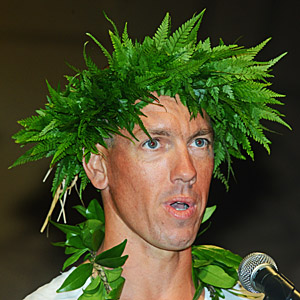
ST: In your relationship with your coach, what are things similar in your personalities and which are different?
Frederik: Like I said, I can keep cool. Luc could do that too in the races. But before the races he was nervous. But the main difference? I always compare that Luc is the big talent and I am the worker. It took me a long time to get to this level in sport. But Luc came here and Bam! He won it! So he is a pure talent and I am more a worker. I like to organize and put things together. I think now that Luc has retired, he can give all his experience to me and pass on what he knows. He confirms what I do right and he tells his athletes he made a lot of mistakes and gives what he learned about them to the athletes he trains.
ST: The most important thing he has advised you?
Frederik: I think we were a perfect match from the beginning. I think I had a couple of really good coaches early on who did excellent things for me. But I just got Luc at the right time in my career. So that, I think, is the main thing.
ST: Could you give us a detail?
Frederik: One of his things that worked really well — last year he had me run 12 or 13 kilometers of the marathon on Monday [before the race]. It is so good to have that in your memory. It worked for him and it works for me as well.
Q: You've been at this sport for 17 years and have two kids at home. Could you retire happy now?
Frederik: I don’t think so. It is true today that I don't feel like I will race it again. But in the next couple of days or weeks I will be longing to race here again in Kona.
ST: Perhaps you want to stop thinking about your ambitions for a while and stop to enjoy this moment away from sport?
Frederik: It is kind of a reward for my kids and family too. Especially my wife Sofie of course, because we have made a lot of sacrifices. We are not in a position that my wife can travel the whole time together with me. Our children have to go to school and play sports — Aaron is 9 years old and Simon is 6 and they both play soccer. So it is not that easy to organize everything. I recognize it is really important that I got the opportunity to do this thanks to the support of a whole lot of people around me.



